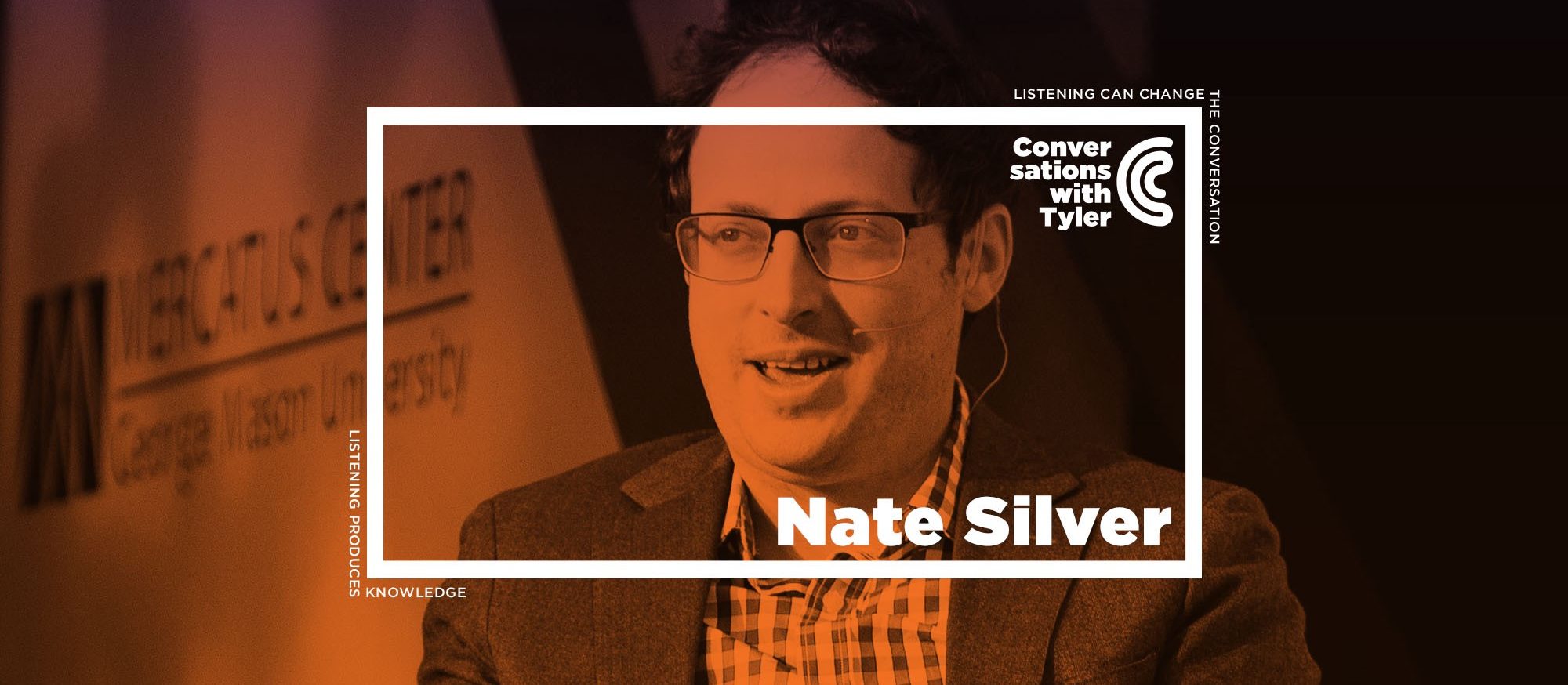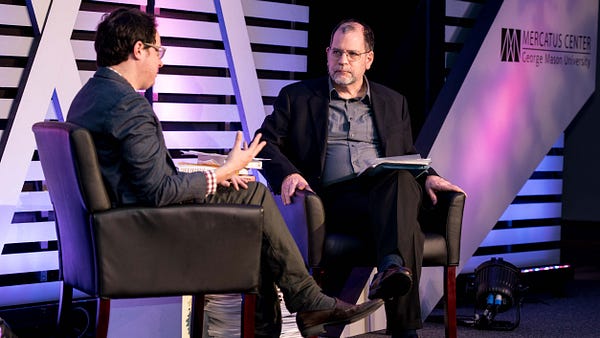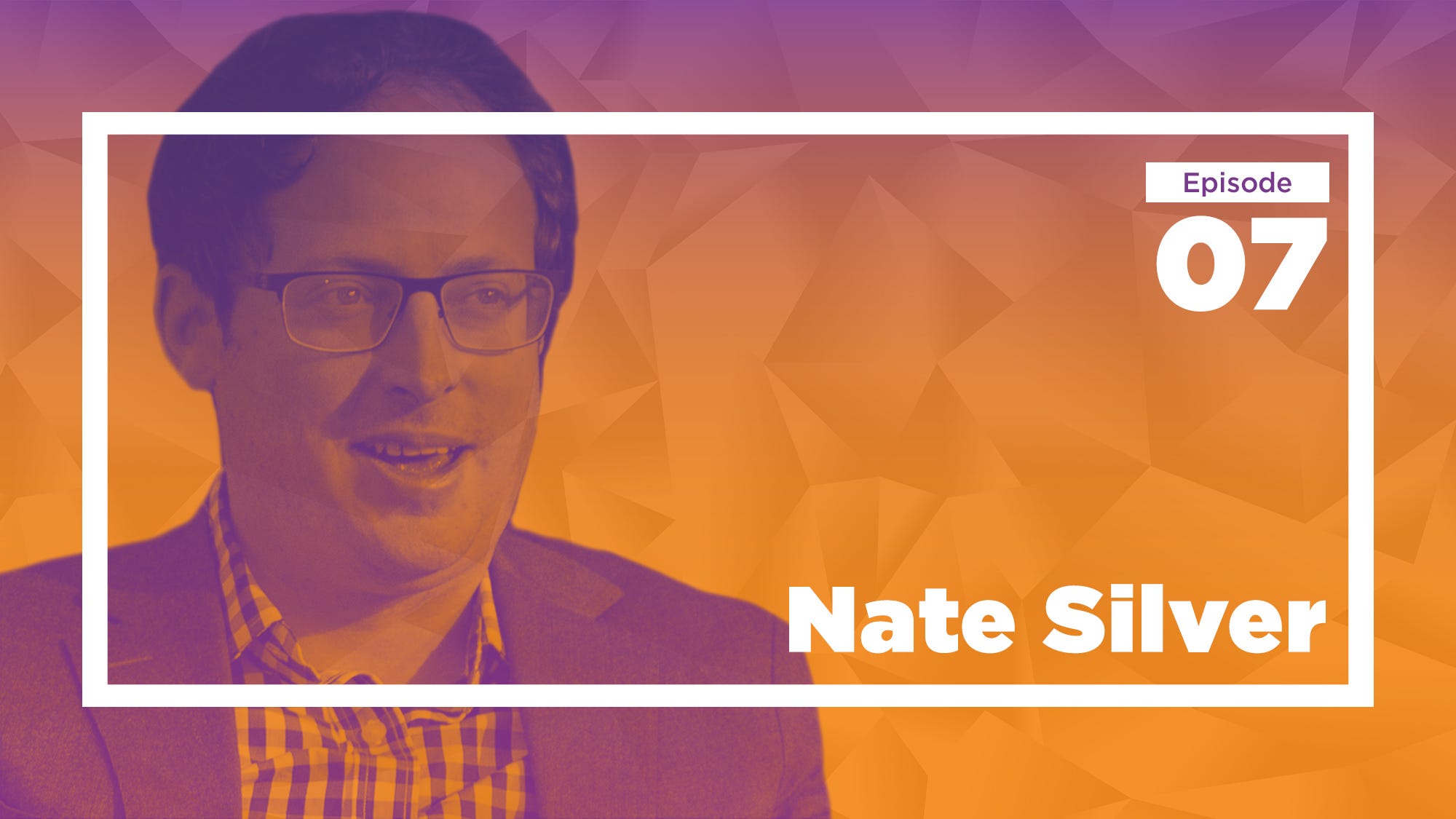Nate Silver joins Tyler Cowen for a conversation on data, forecasting, My Bloody Valentine, the social value of gambling, Donald Trump and the presidential field, vacation advice, Supreme Court picks, the wisdom of Björk, and the most underrated statistic for finding good food.
Watch the full conversation
Read the full transcript
TYLER COWEN: Nate doesn’t need much of an introduction. He is a phenomenon in the areas of data, sports, politics, online media — all the growth sectors, basically. When I think of your work, I think of you as dedicated to the idea of numbers and data and wanting to apply that to as many different areas as possible.
If you had to say of all the areas of human life, where can data bring the biggest improvements, what would your answer be?
NATE SILVER: That’s a pretty heavy question. I should have taken half an hour to think about that. The answers are probably obvious in some sense where health is an area where I’ve not done a lot of work personally, but I’m sure it’s incredibly valuable.
Doctors are not known for being terribly analytics driven. I don’t know the culture enough as to know why.
In terms of areas that I would like us to focus on at FiveThirtyEight a little bit more than we do now, criminality and criminal justice is an interesting area, in part because you have lots of issues with data. If you want to know how many police officers are killed, how many people are killed by police officers, you don’t really know that very well.
Education is an area where I suspect you have a lot of data used poorly as well as data used well.
Urban planning is something we’re fascinated by. We did a big analysis of Uber data that New York City spent like $2 million to conclude, but we concluded on our own in a week or two of work, which is that Uber, by and large in New York, was not adding cars to the streets, at least not in Manhattan.
COWEN: We’re in a law school right now. If we applied a lot more data to the law, what kind of improvement could you imagine we might come up with, just tentatively?
SILVER: See, I think that might be the last field where —
[laughter]
SILVER: Where you would have a lot of — and I don’t say that in a pejorative way at all. But a lot of the advantage of working with data sets and becoming more adept at it is that you get an answer that’s at least approximately right.
Whereas, the legal sector, I think, relies more on precision. You want a very precise and possibly wrong answer, which is what you’re trying to avoid sometimes when you’re doing statistical analysis.
COWEN: I sometimes wonder how much data do people want. As part of my prep for this, I went back to your high school yearbook, and I took a look at the quotation you left. It’s from Macbeth.
It goes as follows: “Then the liars and swearers are fools, for there are liars and swearers enough to beat the honest men and hang up them.”
SILVER: It’s a little self-righteous, but you’re entitled to that when you’re in high school, I think. [laughs]
COWEN: I have no objection to the sentiment, but I’ve read papers which show when you give a lot of people the chance to view the quality of their hospital or doctor, they’re not interested. As a citizenry, how much data do you think people want?
Do you think it’s a kind of entertainment where sports, betting, politics, that kind of horse race, it’s fine, but real data, do people want to see data on how good or how honest they actually are, or is it more like the Macbeth quotation?
SILVER: I’m like that. My partner got really into 23andMe and wanted all this detail. They don’t actually tell you all that much. But I don’t want to have to stress about a bunch of things that I can’t necessarily affect. I don’t know.
The notion of empowering people to make better decisions with their own health is a noble notion. I guess I’m enough of a free marketer that I say you should give people the information whether they use it well or not. It’s their right to have it. I’m not sure I have a firm conclusion about whether it leads to better decisions or not.
Again, my impression is that among doctors and hospital administrators, they’re not terribly data driven either, despite their obviously rigorous work in other respects.
On superforecasting
COWEN: I think of you as a superforecaster, to use Philip Tetlock’s term. Do you think you can beat prediction markets? Not all the time, but a smidgen above average? If this were a game and we were all investors, at the end of 30, 40 years, you’d have some excess returns, just like Cliff Asness, one of our earlier guests.
SILVER: [laughs] Maybe by a very small amount, but not by enough to make up the variance. It depends on what market you’re talking about. The markets in politics are not all that liquid and not all that sophisticated, necessarily.
I know the various sports algorithms that we have at FiveThirtyEight have tended to beat Vegas — not by a lot, but we’ll win 52 percent of the time and so forth on average.
COWEN: That is a lot.
SILVER: It is kind of a lot. This is what I spend a lot of my time thinking about, the dynamics between how markets can be — it’s amazingly arrogant, in some sense, for anyone to think that they can beat markets. [laughs] At the same time, the more worshipful we become of markets, then the less useful they become, as well.
A lot of time I’ll have people say, “Well, I know, say, Donald Trump’s gonna win, because he’s up to 52 percent.” He’s at lower than that now, but at one point, he was up to 55 percent to win the GOP nomination at Betfair. That doesn’t really add any value to the conversation.
I’m more interested, as a person and as a researcher and journalist, in providing information that then other people can aggregate, as opposed to the other way around. If you talk about, “How good are political markets?,” the first question is, “How good are markets?”
The answer to that is “pretty good,” but when the distribution of error is not very linear, when they’re off, they can be off by a lot. Are you the person who knows when they’re off? That’s harder to do, potentially.
On the (distant) future
COWEN: What are the differences between forecasting and futurism, and do you have any predictions for the year 2050? They don’t have to be great. They just have to be better than the market. We’ll take a 52 percent prediction and go home and celebrate.
SILVER: I’m mildly pessimistic in some ways.
COWEN: What’s the biggest source of your pessimism?
SILVER: [laughs] There’s probably some survivorship bias in the United States, and thinking about how our way will persevere forever and ever and ever. We were talking backstage about how you go to Asia and I go to Asia — not as often as you. If you want to feel optimistic about civilization, then go there.
Some of it is thinking about, frankly, this Donald Trump phenomenon.
COWEN: I’ve heard of him.
SILVER: Yeah. It just made me consider that a lot of assumptions a lot of people made about how American politics work are really based on a relatively narrow slice of history, post–World War II through 2000 or so, maybe even briefer, 1980 through 2000. It’s not really a lot of history.

In many other contexts, there are all types of places around the world where nationalism is a much bigger phenomenon than it is in the United States. Race and racism is embedded in a great deal of political turmoil in the United States.
In some ways, I kind of wondered after the Great Recession, “How come we haven’t seen more social upheaval?” Maybe we’re seeing that a little bit delayed. It’s more of a revolution of rising expectations. At the same time, there is such a tendency now to focus on — in politics, people focus on a very small number of stories that are not representative of the big picture.
There is a lot of wonderful news in the world in terms of poverty rates going down globally, income inequality going down, diseases being eradicated, but I wondered, to some extent, how much the media culture tends to focus a lens on negative aspects of society, lower people’s happiness level, and all this type of stuff.
COWEN: More optimistically, how about love and sex? Do you think data can improve matching? Should we just follow the algorithms, or do you think that’s a perpetual dead end and all the algorithms really do is force you chose someone, give you a phony reason and get you out of your indecision?
SILVER: I think that —
[laughter]
SILVER: The market would say that people find online services fairly useful. Maybe it removes some spontaneity. I met my partner at a bar, which almost feels old-fashioned now.
COWEN: But it could be like these pills that are sold, the online services, like a placebo effect.
SILVER: There’s a lot of over-optimization. That’s a problem across almost any sector you’d want to talk about where data is being used. You’re optimizing for a short-term equilibrium, and it’s much harder to measure the long term.
Before, if you couldn’t measure anything at all, then maybe your heuristics aren’t that bad. But if you can say, “What’s going to make me really happy tomorrow? In my business, what’s going to get my website the most traffic 36 hours from now?,” isn’t necessarily the best decision in the long run.
You can measure the short run and not the long run, and measure some things, not others. That can make you quite myopic and is a bigger problem than people realize, perhaps.
On Trump — and other political predictions
COWEN: You mentioned Donald Trump a moment ago. I had told quite a few people I didn’t think Trump could get very far. It’s not obvious that I was right.
[laughter]
COWEN: Paul Krugman said pretty early on that Trump had quite a good chance. What is it that Paul Krugman saw that I didn’t?
SILVER: I was one of the Trump skeptics, too. Let me say I thought you’d ask a version of this question.
COWEN: But I wasn’t allowed to blame you, so I put it on myself. I’m still not sure you were wrong, but there’s something we didn’t see.
SILVER: That is important, I think. I got a little frustrated, because a lot of people were saying, “Trump’s instantly going to evaporate in the polls.”
If you go back and look at what we wrote, we said, “That could happen, but there are also a lot of candidates — Pat Buchanan, and so forth, Ron Paul, Rick Santorum — who will get 20, 25, 30-something percent of the electorate, and we have a high-floor, low-ceiling type of candidate.” That could still wind up being true.
With that said, for one thing, we’re dealing with a fairly small sample of relevant elections. People look at, in the primaries, going back to 1972. One very basic lesson is that when you have a sample size, let’s say it’s roughly 15, there’s nothing you can do to make it not a sample size of 15.
No matter how compelling you can make your rationalization to say, “Well but, you know, we have theory as well as empirics here,” still, 15 cases is 15 cases. I think maybe making people more cautious about saying “Unlikely” versus “Never.” Now, the record will show we said “Unlikely” and not “Never,” but still it’s a lot of things to think about.
You talked about what superforecasters are supposed to do —
COWEN: That’s you, yes?
SILVER: Yeah. You start with priors. You can say, “The prior is that candidates like Donald Trump tend not to win the nomination. So what signs could I find that would violate that assumption?” It’s not necessarily performing well in early polls. Lots of candidates who are flashes in the pan — I guess it’s a little tautological.
Lots of unusual candidates have done well in early polls. Lots of unusual candidates have won Iowa or New Hampshire, not usually both, but one or the other. It’s the ability to consolidate the field after that, by becoming the consensus choice of the party that’s been more unusual. That assumption still might prove to be true.
I did think though that I, and a lot of people, overrated the ability of the Republican Party to stop what I think is, in some ways, a radical insurgency within the GOP.
COWEN: The party’s weaker than you thought. What other judgments about the world do you feel you or I should revise that we once held? Paul Krugman I think would say, “Republicans are more racist than many people believe.” It wouldn’t be my take in particular, but it’s a candidate.
SILVER: To be honest, that’s a little bit of what I wanted to resist. Actually, I think one lazy heuristic that, in my thinking about Trump I use is (there are exceptions — Paul Krugman, Norman Ornstein — who have been very consistent for a long time), but I thought the people who were pro-Trump were generally not people whose opinions I would weight as highly. And I think that’s lazy and possibly quite dangerous.






